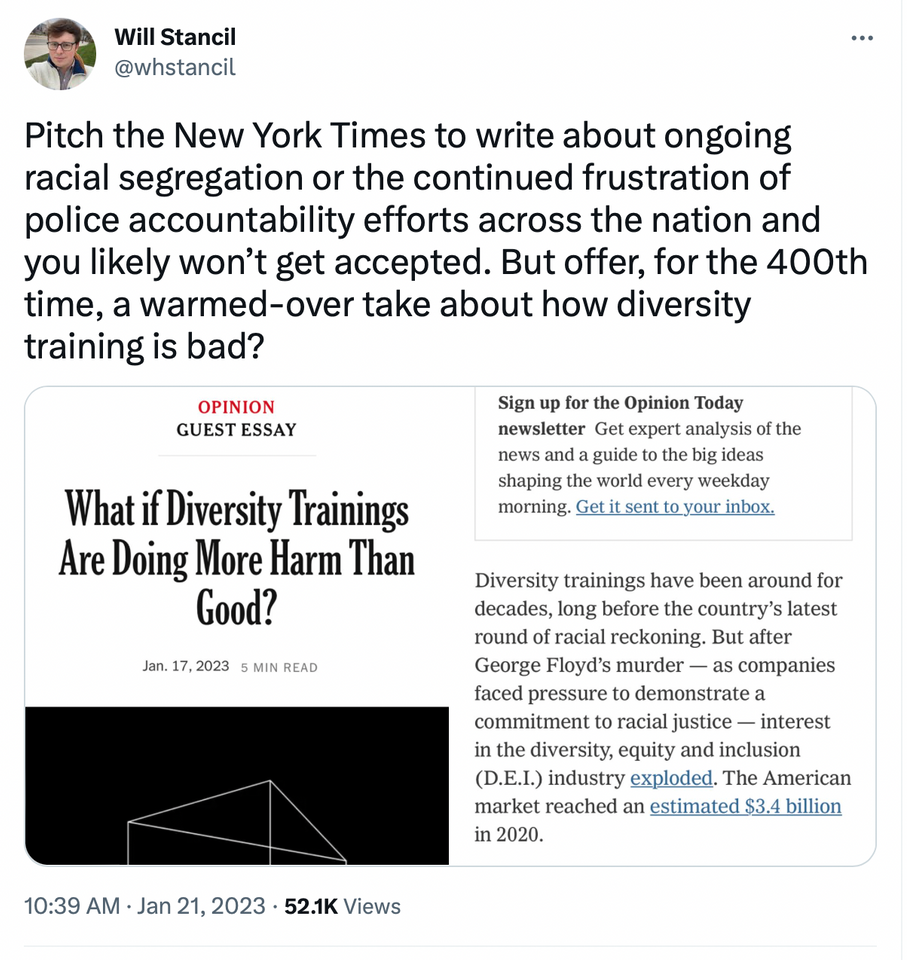 | ![]() | | Photo-Illustration: Intelligencer; Photo: Giorgio Viera/AFP via Getty Images | | | | A key strength of liberal political cultures is that they allow for errors to be identified and corrected. This sounds wonderful in the abstract, and nearly everybody across the ideological spectrum agrees in theory that bad ideas need to be stopped. In practice, there is always enormous pressure to support your political allies. Sometimes this pressure takes the form of endorsing outright lies. More often, it manifests in the form of contorted refusals to say what you believe. This tendency can be found on the right and the left alike. |
| One of the clearest case studies of this dynamic in action can be seen in the mainstream right’s response to Ron DeSantis’s anti-vaccine crankery. DeSantis’s support base includes a powerful faction of conservative actors who understand vaccines are safe and effective and want their party to stand for this idea. |
| Many of the pro-vaccine DeSantis supporters write for National Review. Their strategy has been to insist at first that DeSantis was a vigorous supporter of the COVID-19 vaccine (which, in fact, he used to be). Then, as he turned against the vaccines, rather than criticize the dangerous and kooky rhetoric and positions DeSantis adopted, they denied the shift was taking place. |
| Their silence gave DeSantis cover to continue his anti-vaccine turn — as he grew more extreme on the issue, he picked up more and more support from the burgeoning anti-vaccine movement without losing any support from pro-vaccine conservatives, whose relentless flattery of the Florida governor continued unabated. |
| Finally, DeSantis’s anti-vaccine stance has reached the stage of being so undeniable that pro-vaccine conservatives simply refuse to mention it at all. |
| Consider the stages of the regression in order. In the summer of 2021, DeSantis was beginning to court anti-vaxxers by taking steps such as forbidding cruise ships from requiring their passengers to show proof of vaccination. National Review senior writer Dan McLaughlin praised “the vigorous and noisy efforts DeSantis has made to get Floridians vaccinated,” and its editor-in-chief, Rich Lowry, emphasized DeSantis’s then-extant support for vaccination. |
| Toward the end of 2021, DeSantis plunged further into the anti-vaccine movement, placing more tension on his pro-vaccine supporters. They responded by insisting, sometimes angrily, that he wasn’t really courting vaccine skeptics or sowing doubt about the efficacy of the jabs. “DeSantis has never been anti-vaccine, but has opposed vaccine mandates, vaccine passports and masking in schools,” claimed Lowry in December 2021. (By that point, DeSantis had appeared at a rally beside an anti-vaxxer who told the audience the vaccine “changes your RNA” and recruited vaccine skeptic Joseph Ladapo to serve as the state’s top health official.) |
| McLaughlin insisted DeSantis remained a supporter of vaccination and had merely undertaken a “shift in emphasis” that was “grounded in a rational assessment that we had reached the point of diminishing returns in trying to talk people into the vaccines and that were going to end up inflicting more harm than good with heavy-handed government mandates aimed at the most recalcitrant holdouts.” This very strategic and calibrated tweak to his messaging was somehow consistent with a broader plan to promote the COVID vaccine. |
| By now, DeSantis has plunged so deep into anti-vaccine kookery that his pro-vaccine supporters have given up the ghost. Ladapo has gone on QAnon shows to spread conspiracy theories about the vaccines, while DeSantis himself is claiming, “You are more likely to get infected with the bivalent booster.” |
| The response from pro-vaccine DeSantis supporters is not to admit error but to pretend it’s not happening. Lowry has written an entire column on how DeSantis is going to beat Trump on COVID issues. The obvious centerpiece to his strategy has been courting vaccine skeptics who resent Trump for Operation Warp Speed. Trump was booed by an audience for touting the effort and is countering DeSantis’s courtship of the anti-vaccine movement by reminding his audience that DeSantis used to promote the jab. |
| Lowry’s column doesn’t mention any of this. He invokes vaccine mandates and vaccine passports but does not refer to the fact that DeSantis is beating Trump by endorsing vaccine skepticism. The whole thing exists in an alternate universe in which one can imagine the efficacy of COVID vaccines is a matter of universal assent. |
| I’ve written extensively about DeSantis’s regression and how it was enabled by allies who knew better. I think it’s important in its own terms: The rise of anti-vaccine sentiment on the right, which is spreading to other vaccines conservatives used to have no problem with, is a serious public-health crisis. But I also think it represents a broader pathology with conservative politics. The conservative movement has developed internal political norms that make it difficult, and frequently impossible, for people with sane beliefs to speak out candidly against insane beliefs. |
| When the sane do speak up, they must couch their concerns in the softest terms. Usually it is wrapped in the guise of some fantasy, projecting imaginary beliefs onto the party in order to avoid grappling with some unacceptable position. |
| Two decades ago, I would have said this dynamic was almost entirely exclusive to conservatives, at least in the American context. But there is a growing sphere of progressives dedicated to copying a version of this style. |
| Here is one example of the method in action. A few weeks ago, Jesse Singal, a former colleague, wrote a New York Times op-ed arguing that evidence suggests diversity training is ineffective and may even be counterproductive. |
| This was met, predictably, by a wave of complaints. Here was Will Stancil complaining that Singal’s argument was redundant: |
| And here was Michael Hobbes dismissing it because Singal has criticized the left on racism before: |
| Hobbes and Stancil have a prominent role among a coterie of left-wing pundits who reliably denounce any criticism of the left by the center-left. Sometimes their complaints focus on the substance of the argument in question. Other times, they simply denounce the objectionable position being published at all. |
| It’s notable that neither engages with the evidence amassed by Singal, nor do they even bother to register their disagreement with his conclusion. Their complaint is that it is being said (Stancil) or that Singal is saying it (Hobbes). Stancil also posits that the Times does not publish op-eds about racial segregation or the need for police reform, a claim that, even if true — and a Google search easily proves it is complete nonsense — has no bearing on Singal’s point. |
| I suppose one might argue that some criticisms of the left are so widely believed and undisputed that repeating them serves no purpose at all. But this argument would require conceding that the criticism is true. In a world where everybody on the left understood that diversity training was useless, there would indeed be no point in an op-ed calling it useless. (To be fair, the need to bring unique insights is not a standard progressives apply to topics such as “Is climate change serious?,” “Does Donald Trump tell lies?,” and so on.) |
| But no consensus like this exists. Diversity training remains a giant, multibillion-dollar industry. You would think progressives, who are correctly invested in the success of anti-racism, would care whether this enormous investment — one that, for millions of Americans, represents their most direct exposure to anti-racist thinking — is making the situation better or worse. |
| And I suspect people like Stancil and Hobbes do care. But they care more about preventing their allies from being criticized in the Times. They don’t say Singal is wrong about the efficacy of corporate anti-racism training. |
| But they also don’t concede he is correct because this would mean breaking ranks with their allies, a violation of the “no enemies to the left” norms they are committed to upholding. Like the pro-vaccine DeSantis supporters, they are engaged in a kind of strategic silence. |
| The objection that a criticism of the left is excessive or redundant is a common one. I hear it every time I criticize the left. I’ve found that people have an almost unlimited appetite for opinions that praise their allies and castigate their enemies. Opinions that question their allies or concede a point to their enemies grow tedious very quickly — often as quickly as the very first time such a view is encountered. |
| Obviously, not every criticism of the left by the center-left should be taken as true. Nor, for that matter, should every criticism of the right by the center-right. The truth of any proposition needs to be demonstrated through argument. When an important question is being talked around, or when you are told it is bad form to raise it, that is when suspicions ought to rise that you are watching somebody cover for the errors of an ally. |
| Stay informed about business, politics, technology, and where they intersect. Subscribe now for unlimited access to Intelligencer and everything New York. |
| If you enjoyed reading &c. by Jonathan Chait, forward it to a friend. For more from Intelligencer, sign up for the daily newsletter or One Great Story to get a single editor-selected longread sent to you every weeknight. |
| | |




